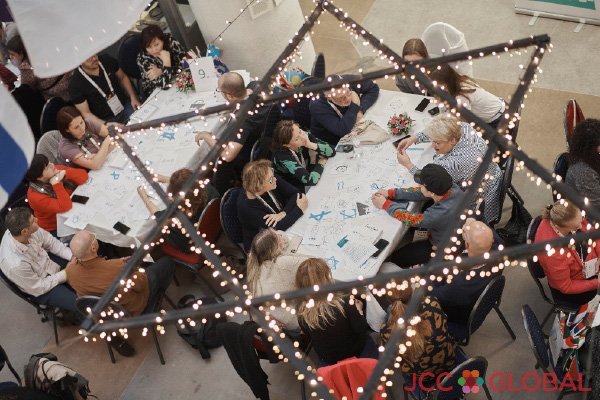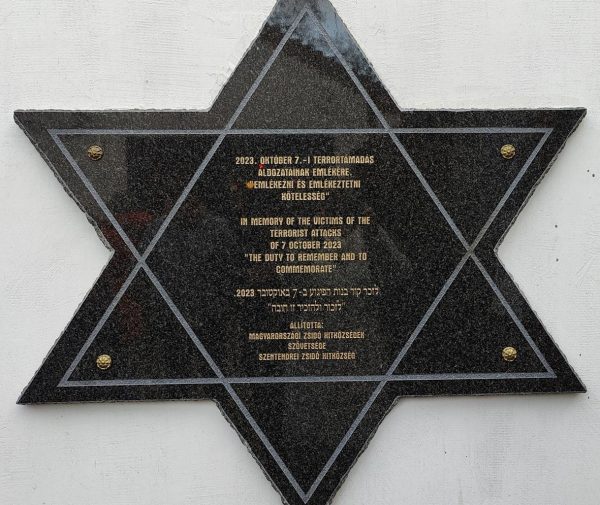By Leah Garber
I write to you today from Budapest, Hungary, following four days of the “From Good to Great” conference organized by JCC Global under the leadership of Smadar Bar-Akiva, the organization’s CEO.
The conference brought together JCCs from more than 10 countries, including two war-torn communities—Israel and Ukraine, which is marking its 34th month of war. Representatives also were present from Latin America, various European countries, and nine JCCs from North America, including:
- Marcus JCC, Atlanta, Ga.
- JCC of the East Bay, Berkeley, Calif.
- Shimon and Sara Birnbaum JCC, Bridgewater, N.J.
- Edith and Carl Marks JCH of Bensonhurst, Brooklyn, N.Y.
- Pozez JCC of Northern Virginia, Fairfax, Va.
- Merage JCC of Orange County, Irvine, Calif.
- JCC of Greater Baltimore, Owings Mills, Md.
- Mandel JCC, Palm Beach Gardens, Fla.
- Siegel JCC, Wilmington, Del.

The bone-chilling cold in Europe failed to penetrate the warmth of human bonding and shared destiny that embraced us. Despite the different languages echoing in the room and the cultural differences unique to each community, what united us was palpable. We share the same fate, same destiny, mutual hopes.The representatives from Ukrainian JCCs, whose airspace has been closed since the beginning of the war there, traveled more than 20 hours by train to reach Budapest. They left behind destroyed cities, split families—some of whom are refugees in other countries—and a dangerous, exhausting, and frustrating daily routine that has continued for nearly three years. They shared their difficulties and pain that, to Israeli ears like mine, sounded so familiar. They described their work to maintain Jewish communal life in Ukraine’s stricken cities, the sense of mission that kept them behind to preserve the Jewish community’s ember while their families fled from the terrors of war. Above all, they shared the strength and power they draw from the support they receive from communities across the Jewish world. As I listened to them, I heard myself. Together with them, I felt the powerful embrace of support without which the winds of war would be unbearable, both for us in Israel and for them in Ukraine.
I listened to representatives from JCC communities in Europe, Latin America, and North America describe their daily struggles against antisemitism, which is the second front of the war in Israel and given its rising rates, intensifies day by day. All emphasized that the only way to confront the ugliness and danger is through community connection, adherence to Jewish identity, and a commitment to stand alongside Israel and every Jewish community in the world. Especially at times of crisis, they said, it is imperative never to give up and to amplify joyful community programming and proudly raise Israeli flags in the face of keffiyehs worn by those supportive of Hamas.
In one workshop, we were asked to choose an image from a deck of cards that represents our Jewish identity. I chose a card that depicted a Star of David made from a single long thread, with six people holding its ends. If any of these people were to release their grip on the connecting thread that formed the Star of David, it would unravel and disappear. My Jewish identity stems from the responsibility I share with everyone else who sees themselves as part of our Jewish family and is devoted to preserving and strengthening all that we share—Jewish life and values, Zionism, traditions and centuries-old multifaceted culture.

Beautiful, vibrant Budapest, now festively adorned with Christmas lights, has known dark days in which Jews were persecuted. Hungarian Jewry has existed continuously in since the days of the Roman Empire. Under Austro-Hungarian rule, the community grew and flourished, achieving emancipation. At its peak, the population of greater Hungary exceeded 900,000. During the Holocaust, most of the country’s Jews— approximately 564,500 of about 725,000—perished, deported to Auschwitz by the Germans or oppressed and massacred by Hungarians.
Various memorial sites to Budapest’s Jewry tell the story of one of Europe’s most magnificent Jewish communities and the price the people paid for being hated. It’s difficult to walk through Budapest’s bustling streets without thinking about the clouds of war that once covered the city and allowed the Nazis to kill hundreds of thousands, solely for being Jewish. It’s hard to enjoy its grand squares without imagining the Jews who were ordered to gather there to be deported to death camps. I can still hear their cries, feel the terror that gripped them. It still hovers in the air, and all the colorful holiday lights cannot silence it. They will never be forgotten.
But Budapest’s Jewish community was not entirely obliterated. Survivors rebuilt the community and established important Jewish institutions, including an active and busy JCC in the city center that serves as a Jewish cultural and social hub. We heard from JCC leaders there about how their personal and professional present is intertwined with the Holocaust and its horrors; how their Jewish identity has been shaped by the community’s history; and how it guides their involvement in preserving the community today.

I arrived in Budapest exhausted and sad. The long war and the unknown fate of the hostages, whose lifeline grows shorter with each passing day, continue to exact a national and a personal toll. We are all trauma-stricken. But during the four days in Budapest, I was filled with new strength and inspiration. The one shared language we all spoke and understood—the language of community and solidarity, Jewish peoplehood and pride—was the comfort I needed, the comfort we all needed.
The conference’s goal was to create partnerships among communities and build connections to strengthen and enrich one another through cultural ties woven by getting to know the beauty and richness of other communities. We came together to support and be supported and to embrace and nurture our shared passion for connecting people and creating community.
I will return to Israel tonight, and back home I will cherish the sense of Jewish peoplehood that enveloped us during our four days together. I will hold even more strongly to the belief that each of us is a link in the long chain of generations; that each of us helps shape the thread that forms the Star of David and is committed to keep holding it tightly—for the sake of our shared present and future and out of deep respect, appreciation, and gratitude to our brothers and sisters whose lives were cut short by evil during World War II and 433 days ago. I return to my beloved homeland stronger, richer, and filled with Jewish pride, an empowering sense of belonging, and certainty that despite the differences and variations among us, we are one people.
Last night we floated upon the tranquil waters of the Danube River that in the past absorbed the blood of many innocent Jewish lives slaughtered upon its banks. Just as its waves churned and raged against the injustices of that time, so too shall today’s storms calm, and may we see better days, days of peace, ahead.
Together, united, we will overcome.
Leah Garber is a senior vice president of JCC Association of North America and director of its Center for Israel Engagement in Jerusalem.